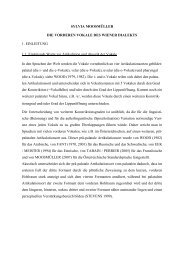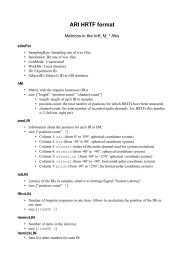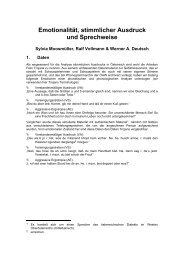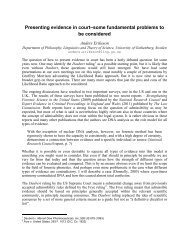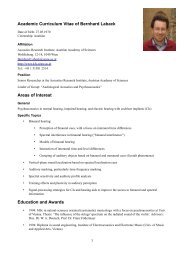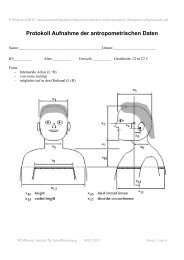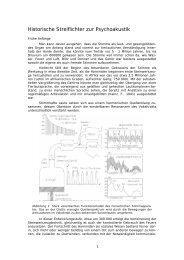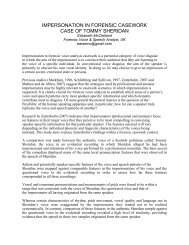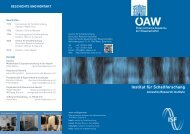VOWELS IN STANDARD AUSTRIAN GERMAN - Acoustics ...
VOWELS IN STANDARD AUSTRIAN GERMAN - Acoustics ...
VOWELS IN STANDARD AUSTRIAN GERMAN - Acoustics ...
You also want an ePaper? Increase the reach of your titles
YUMPU automatically turns print PDFs into web optimized ePapers that Google loves.
187<br />
Vowels in Standard Austrian German<br />
suppressed and which are allowed, in order to maintain the relevant oppositions 122 (see<br />
also Donegan 2002). Therefore, it is not a segment which does or does not exert a<br />
certain influence on contiguous segments, but the phonology of a language which<br />
decides on the status of the phonemes and, hence, whether they are allowed to exert an<br />
influence or not. From this follows, logically, that a certain output is not left to some<br />
uncontrolled biomechanical circumstances, but planned and exerted via processes.<br />
“Speakers do not simply line up a sequence of phonemic targets and allow the articulators to<br />
get from one to another as best they can; instead, the activity of articulation is centrally<br />
planned, so that features spread (or gestures overlap) in regular ways. This planning differs<br />
from language to language, […]” (Donegan 2002: 69)<br />
Therefore, the whole string from the initial planning of an utterance up to its final<br />
output is – under the above-mentioned conditions – planned and under the control of the<br />
speaker. In this way, phonetics is part of the grammar.<br />
6.4. Missed targets<br />
6.2.1 Speech errors<br />
Cases where the target is not hit, exist of course. However, under “normal” conditions,<br />
these cases are rare and can be subsumed under what is usually called speech errors.<br />
Figure 6.3 gives an example of such an error, where the target vowel quality is not<br />
reached.<br />
In this example, the speaker intends to read the utterance „Heinz regelt das für<br />
dich, er wird ein Lokal finden“ (Heinz will settle this for you, he will find a good place).<br />
For some reason, the speaker does not succeed in producing the right target for the<br />
vowel /ç/. Instead, he realizes the vowel /E/. He stops immediately after he had realized<br />
that he had produced the wrong vowel and, after a short break, starts with a second trial<br />
for the word “dich” (you). A comparison of the formant frequencies in the vowel /E/<br />
122 The differences between Russian and Standard Austrian German vividly show that there<br />
are no “default values” (Fowler 1990) which need not be modelled via processes.



